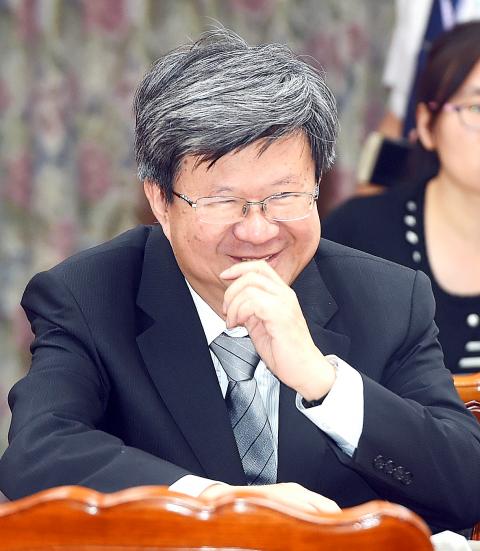Efforts to cut Minister of Education Wu Se-hwa’s (吳思華) stipend were stymied in the legislature yesterday, after legislators failed to reach a consensus.
Several lawmakers submitted proposals to reduce Wu’s stipend, which totals about NT$1.18 million (US$55,458), during a meeting of the Education and Cultural Committee, which was called to review budgets proposed by the ministry.
Democratic Progressive Party (DPP) Legislator Cheng Li-chun (鄭麗君) suggested that Wu’s stipend be reduced by NT$723,000.

Photo: Liao Chen-huei, Taipei Times
Cheng said the cut would serve as a reminder to Wu of his poor handling of the recent protests staged by students opposing what they call “China-centric” adjustments to high-school curriculum guidelines.
Cheng said that the ministry’s ordering the arrest of a group of students and three reporters was unprecedented and has set a bad example for government agencies that are prone to becoming the focus of protests.
She said that arresting reporters had created a “chilling effect,” and its repercussions could still be felt throughout the media industry.
Cheng said that the ministry had failed to act in compliance with conclusions reached during a cross-caucus negotiation in August to resolve the standstill between protesters and the ministry to reshuffle its curriculum review committee, and instead established a “task force” to review the much-maligned history curriculum.
The task force has been criticized by several DPP legislators, who call it an offshoot of the committee, as all conclusions reached by its members must be submitted to the committee, which has the final decision on whether to defer.
Referring to an official visit Wu made to Germany in August, on which he took three days off in Berlin, Cheng said that Wu had set another bad example by going on a holiday when controversies surrounding the curriculum guidelines were still raging.
Wu said that the ministry reported “unidentified civilians” who entered its premises to the police in compliance with legal procedures and on the following day issued a public statement that it would respect reporters’ work.
Wu said that the task force was formed because history is a discipline that requires professional input, adding that a list of its members would be published next week.
Wu said that he spent time in Berlin because Premier Mao Chi-kuo (毛治國) had at the time of the protests asked him to take some time off to “contemplate his future.”
“I figured that spending a holiday in Berlin was the best option, as it would allow the security personnel and police who had been working long shifts in the wake of the protests some breathing room,” he said.
Cheng’s proposal was blocked after meeting with the objection of Chinese Nationalist Party (KMT) Legislator Chen Shu-hui (陳淑慧).

Chinese Nationalist Party (KMT) Chairman Eric Chu (朱立倫), spokeswoman Yang Chih-yu (楊智伃) and Legislator Hsieh Lung-chieh (謝龍介) would be summoned by police for questioning for leading an illegal assembly on Thursday evening last week, Minister of the Interior Liu Shyh-fang (劉世芳) said today. The three KMT officials led an assembly outside the Taipei City Prosecutors’ Office, a restricted area where public assembly is not allowed, protesting the questioning of several KMT staff and searches of KMT headquarters and offices in a recall petition forgery case. Chu, Yang and Hsieh are all suspected of contravening the Assembly and Parade Act (集會遊行法) by holding

PRAISE: Japanese visitor Takashi Kubota said the Taiwanese temple architecture images showcased in the AI Art Gallery were the most impressive displays he saw Taiwan does not have an official pavilion at the World Expo in Osaka, Japan, because of its diplomatic predicament, but the government-backed Tech World pavilion is drawing interest with its unique recreations of works by Taiwanese artists. The pavilion features an artificial intelligence (AI)-based art gallery showcasing works of famous Taiwanese artists from the Japanese colonial period using innovative technologies. Among its main simulated displays are Eastern gouache paintings by Chen Chin (陳進), Lin Yu-shan (林玉山) and Kuo Hsueh-hu (郭雪湖), who were the three young Taiwanese painters selected for the East Asian Painting exhibition in 1927. Gouache is a water-based

Taiwan would welcome the return of Honduras as a diplomatic ally if its next president decides to make such a move, Minister of Foreign Affairs Lin Chia-lung (林佳龍) said yesterday. “Of course, we would welcome Honduras if they want to restore diplomatic ties with Taiwan after their elections,” Lin said at a meeting of the legislature’s Foreign Affairs and National Defense Committee, when asked to comment on statements made by two of the three Honduran presidential candidates during the presidential campaign in the Central American country. Taiwan is paying close attention to the region as a whole in the wake of a

OFF-TARGET: More than 30,000 participants were expected to take part in the Games next month, but only 6,550 foreign and 19,400 Taiwanese athletes have registered Taipei city councilors yesterday blasted the organizers of next month’s World Masters Games over sudden timetable and venue changes, which they said have caused thousands of participants to back out of the international sporting event, among other organizational issues. They also cited visa delays and political interference by China as reasons many foreign athletes are requesting refunds for the event, to be held from May 17 to 30. Jointly organized by the Taipei and New Taipei City governments, the games have been rocked by numerous controversies since preparations began in 2020. Taipei City Councilor Lin Yen-feng (林延鳳) said yesterday that new measures by